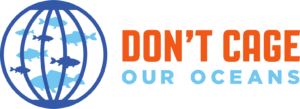Join Now! Just fill out this form.
What Does it Mean to be a DCO2 Member?
Don't Cage Our Oceans’ members endorse our mission, vision, and values to fight offshore finfish farming, while uplifting sustainable alternatives. With this endorsement, DCO2 can act nimbly as one united coalition! To join, fill out this form. Or, contact us.
Who Can Join?
Any organization or business who agrees with our mission, vision, and values. Our members represent national, regional, and local interests.
Why Join?
To be part of a community that works together to stop offshore finfish farming in our federal waters, while uplifting values-based seafood systems led by local communities!
As a member, you will have access to internal planning documents, sign-on letters, forums, and other resources to fight offshore finfish farming as a coalition. DCO2 staff will coordinate meetings for you with your policy makers and provide talking points. You will receive support and opportunities to submit letters to the editor and op-eds. And - you can attend our annual meeting - which is a balance between fun and work!
How To Join?
It is easy and it is free. Just fill out this form. Or, contact us!
What Are Our Mission, Vision, and Values?
Mission statement: To stop the development of offshore finfish farming in the United States through federal law, policies, and coalition building, while uplifting values-based sea-food systems led by local communities.
Vision:
- No offshore finfish farms
- Community-based food security and food sovereignty
- Equity and justice in the food system
- Reduced corporate control / take-over of resources
- Respect of our natural environment and wildlife
- Innovative, smart food production practices that help mitigate climate change
- Oceans Commons protected from industrial aquaculture
Values:
- Community-based Food Systems. Food systems embedded in local communities, where the collection, production, and distribution are based on local human and natural culture. A sea-food system values quality over quantity, and communities and the environment over the corporate bottom-line.
- Diversity & Environmental Respect and Protection. Black, Indigenous, and people of color (BIPOC) are highlighted and uplifted. Natural resources are valued for their rich diversity and the food systems reflect and protect natural abundance.
- Food Sovereignty. Communities have control over their food systems, including governance and market structures. Food is a basic human right and respects the rights of mother earth.
- Science-based Advocacy. Sound scientific research that is not influenced or dominated by corporate interests. Traditional knowledge is acknowledged and respected.
- Oceans Commons. Respect and value the public commons of our oceans. Protect our oceans from efforts to cordon off areas for industrial aquaculture.
